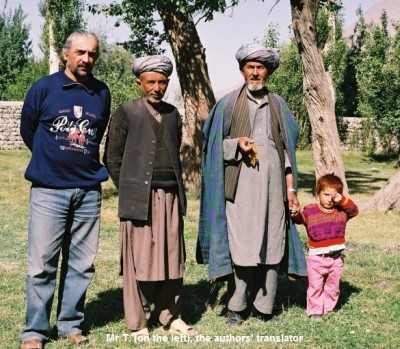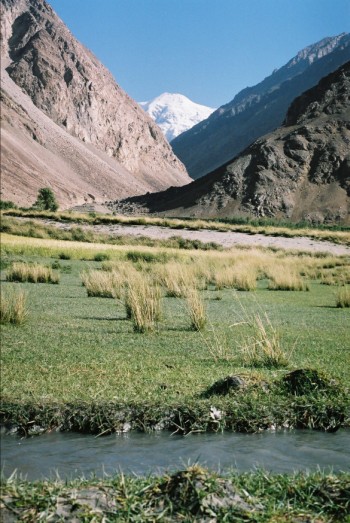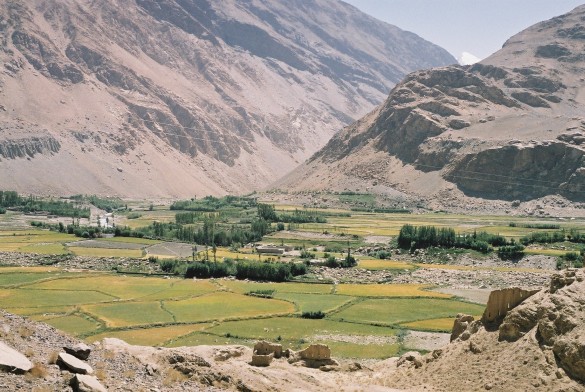Karzai rules out sharing power
President Hamid Karzai’s team shifted aggressively into campaign mode Saturday and ruled out any possibility of a power-sharing deal with challenger Abdullah Abdullah ahead of a runoff election in two weeks…
Snow and freezing weather could make voting impossible in some parts of the country. And many people say there is not enough time to replace and vet election officials to prevent fraud. Karzai initially received 54 percent of the vote, but nearly one-third of his votes were considered rigged and he finished with 49 percent.
“When you have a million-odd votes thrown out, you’ve got to ask yourself, what was the IEC doing and who is going to be held accountable?” said Saad Mohseni, an owner of a prominent media company in Afghanistan.
Election officials plan to reduce the number of polling places from about 6,300 to about 5,800 in an attempt to prevent fraud in volatile areas where votes were recorded at stations that never opened.
One senior Western diplomat, speaking on the condition of anonymity because he was not authorized to speak to the media by name, said there was “way over a 50-50 chance” that the runoff would be held despite the potential problems. [continued…]
If this is progress, what would an Afghan disaster look like?
U.S. commanders on the ground are not setting nearly as much store by the election saga as are their political overlords in Washington. Gen McChrystal is making clear that Mr Obama can no longer afford to delay the issue of reinforcements, stressing that simply stopping the Taliban from extending its control over much of the countryside in the south and east will require 40,000 more troops – and he would prefer 80,000. Moreover, logistical constraints mean they can be introduced only at a rate of around 4,000 a month.
The war may look unwinnable to any student of history, but Americans often imagine themselves immune to history’s rules, and Mr Obama doesn’t want to go into the next election being pilloried for “losing” Afghanistan (not that the Taliban will necessarily sweep back into Kabul, but they could do a pretty good job of surrounding the cities and choking Nato supply lines).
So it’s a safe bet that Mr Obama will escalate US military involvement, even as he promises increasingly sceptical Democrats that the Afghan security forces are being “trained” to take over security in the near future. This, too, is something of a fiction: when 4,000 US Marines deployed in Helmand shortly before the election, they took with them 400 Afghan troops who showed little appetite for getting out among the people. Close to 100,000 Afghan troops have been trained, but how effective they are in fighting the Taliban is anybody’s guess. [continued…]
What perhaps finally brought Karzai into the real world was [Rahm] Emanuel going public with a statement on October 18—which Kerry had been privately drumming into Karzai for days—that Obama would not commit to sending any more US troops to Afghanistan until there was a “legitimate” and “new” government in Kabul.
The underlying message was that if Karzai still refused to listen he could be held responsible for allowing Afghanistan to go down the tubes or be taken over by the Taliban. Even though Karzai has a gigantic ego and was still in a state of denial, he could not get around that one.
Kerry, Eikenberry, and Emanuel had one thing going for them that others working the Afghan shift in the White House—Richard Holbrooke, Joe Biden, James Jones, General David Petraeus, and even Obama himself—did not have. These three had never criticized Karzai in public before. Karzai intensely dislikes the other White House players because they have hurt his ego by dishonoring him and criticizing him in public. Over such knowledge and niceties does the world turn and turn again. [continued…]


 We entered Afghanistan from Tajikistan by walking unescorted across the no-man’s land at the Oxus River border station at Eshkashem. We were dressed as civilians and carried our own packs: no vehicles, no flak jackets, no body guards, just plain folks. We were, however, accompanied by our impressive guide and translator, whom we shall simply call Mr. T., a Tajik native of Khorug and a speaker of Tajik and Russian (he spent four years studying film at the academy in Moscow and, like all other Tajiks in his age group, served in the Russian army), as well as Dard; but his native language is Shugni, which is also widely spoken across the Oxus from Khorug in Afghanistan, as is Tajik: there are as many Tajiks (four and a half million) in Afghanistan as in Tajikistan. Then, too, Mr. T. had spent eleven years in Afghanistan working for Focus.
We entered Afghanistan from Tajikistan by walking unescorted across the no-man’s land at the Oxus River border station at Eshkashem. We were dressed as civilians and carried our own packs: no vehicles, no flak jackets, no body guards, just plain folks. We were, however, accompanied by our impressive guide and translator, whom we shall simply call Mr. T., a Tajik native of Khorug and a speaker of Tajik and Russian (he spent four years studying film at the academy in Moscow and, like all other Tajiks in his age group, served in the Russian army), as well as Dard; but his native language is Shugni, which is also widely spoken across the Oxus from Khorug in Afghanistan, as is Tajik: there are as many Tajiks (four and a half million) in Afghanistan as in Tajikistan. Then, too, Mr. T. had spent eleven years in Afghanistan working for Focus. Despite such diversity in the Wakhan Corridor, there was a unanimous belief that the Afghan government is simply an outrageous band of crooks on the take and that Hamid Karzai is chief among them. This disgust cut across all linguistic, age and belief groups. It was barely below the surface of any discussion, as was the question of when the “foreigners” would leave. There was no blaming the Russians, nor even our guide, Mr. T., who, as a Tajik, was clearly from the “wrong” side when talk turned to the Soviet era. The wreckage of that period is plain to see: discarded tank turrets decorate many of Eshkashem’s street corners. Most significantly, while there was a firm awareness of local pride of place, there was no patriotic fervor for an Afghanistan, seemingly a very alien concept for many.
Despite such diversity in the Wakhan Corridor, there was a unanimous belief that the Afghan government is simply an outrageous band of crooks on the take and that Hamid Karzai is chief among them. This disgust cut across all linguistic, age and belief groups. It was barely below the surface of any discussion, as was the question of when the “foreigners” would leave. There was no blaming the Russians, nor even our guide, Mr. T., who, as a Tajik, was clearly from the “wrong” side when talk turned to the Soviet era. The wreckage of that period is plain to see: discarded tank turrets decorate many of Eshkashem’s street corners. Most significantly, while there was a firm awareness of local pride of place, there was no patriotic fervor for an Afghanistan, seemingly a very alien concept for many.